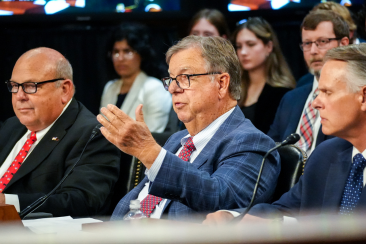By Clint Thompson
Florida Farmer of the Year Jim Alderman used his testimony during last week’s appearance at the Senate Special Committee on Aging hearing to remind congressional leaders about the need for the agriculture industry to get younger.

“At the age of 78 years old, I’ve spent four and a half decades working the land,” Alderman said. “I still wake up before sunrise most days like my peers. I’m still going strong because there’s more work to be done. According to the committee’s report, the average farmer is now 58 years old. Nearly 40% of our producers are 65 or older. We’re proud of our experience and knowledge, but the question I ask is, who is coming behind us? That’s the part that keeps me up at night.”
That assistance will help ensure someone will help produce fruits and vegetables long after Alderman is done growing organic vegetables and vine ripe tomatoes. The farmer produces 1,200 acres in eastern Palm Beach County. He believes there is the next generation of farmers but they need assistance in finding their financial footing.
“It’s not just growing the crops, it’s passing down the knowledge, discipline and the way of life. But that chain of succession is breaking. Nationwide, less than 9% of farmers are under 35 years of age. The numbers are even more sobering in states like mine,” Alderman said. “Young people want to farm but they’re running into walls such as expensive land costs, expensive equipment costs. The costs of financing is very difficult.”
Producers like Alderman also face annual challenges that threaten the future of domestic agriculture. Imports, mostly from Mexico, challenge growers’ sustainability by undercutting market prices by significant margins. It often leads to farmers selling their land and getting out of the industry for greener pastures; which leaves to no future for the next generation.
“Imports are being shipped into this country below our production costs. If the farmer cannot make money, he’s not going to expand his operations. If his opportunity to sell land, which he’s farmed for years, comes, sometimes the opportunity is too great,” Alderman said. “They sell, retire and then development comes.”









